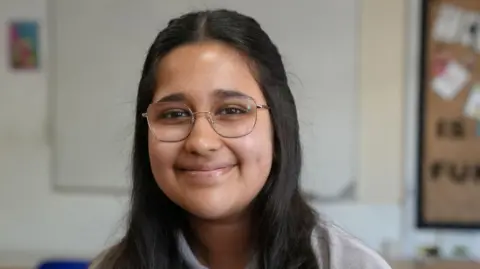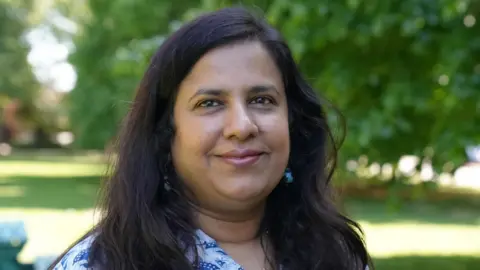'I am proud of my bionic ears'
 BBC
BBCA girl who was born profoundly deaf says she is proud of her cochlear implants and hopes to see a positive change in the perception of people with hearing loss.
Sanemi, 12, could not hear anything when she was born but started wearing the implants when she was 15 months old.
Without technology Sanemi, who lives near Cambridge, would not be able to hear a helicopter even if it was next to her, and said she was "very proud to have my bionic ears".
A YouGov survey commissioned by Auditory Verbal UK revealed only 36% of adults in the East of England believed it was possible for a child born profoundly deaf to speak as well as a hearing child.

The first thing Sanemi heard was the sound of a soft drum bell and she burst into tears at 16 months old, her mum Manjiri said.
But the mum admitted that despite her daughter's tears, her family was happy and relieved knowing Sanemi could hear something.
Cochlear implants have replaced the parts of Sanemi's inner ears that do not work and a sound processor has been put behind her ears.
Sounds are picked up by the processor and sent to the implant.
This converts the noises into signals which are sent via an electrode and to the brain – where she interprets the sound she hears.
Sanemi is a pupil at Comberton Village College and dreams of pursuing a career in languages, or becoming a baker or journalist.
She said: "I can do everything that hearing children can and being deaf has never held me back. Deaf children should never be written off by their disability.
"I am very proud of being a deaf person."
She said thanks to her implants she was also "able to do extra curricular activities such as my Indian dance [and] languages".
Matt Knight, English teacher and head of year eight, said: "Sanemi is a fantastic pupil; she is fully immersed at everything she does.
"She really takes part in a full range of activities; she is fiercely independent."
Her mum said the family found out about their daughter's deafness when she was two months old and had a newborn screening test.
"We couldn't believe and we didn't want to believe it and we went through loads of testing," said Sanemi.
She said the implants were a "life changer - the implant is one element but the journey began and they were done in a very structured manner".
Manjiri said her daughter did not use sign language or lip-read.
"Essentially, communication for her is without barriers because she could be in a setting where nobody is able to sign and she is able to speak," she said.
"Even though someone has a physical disability they are very capable of doing different things and they can achieve as well as a mainstream individual."
Follow Cambridgeshire news on BBC Sounds, Facebook, Instagram and X.
